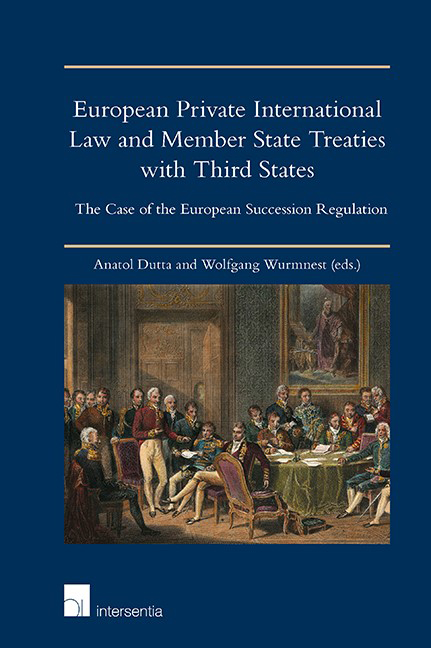 European Private International Law and Member State Treaties with Third States
European Private International Law and Member State Treaties with Third States Book contents
- Frontmatter
- Foreword
- Contents
- List of Treaties and Conventions
- List of Abbreviations
- List of Contributors
- Introduction
- Questionnaire
- PART I THE PERSPECTIVE OF EU MEMBER STATES
- Austria
- Belgium
- Croatia
- Czech Republic
- Finland and Sweden
- France
- Germany
- Italy
- PART II THE PERSPECTIVE OF THIRD STATES
- PART III THE PERSPECTIVE OF THE EUROPEAN UNION AND A COMPARATIVE OUTLOOK
- Annex
- Index
- About the Editors
Belgium
from PART I - THE PERSPECTIVE OF EU MEMBER STATES
Published online by Cambridge University Press: 12 November 2019
- Frontmatter
- Foreword
- Contents
- List of Treaties and Conventions
- List of Abbreviations
- List of Contributors
- Introduction
- Questionnaire
- PART I THE PERSPECTIVE OF EU MEMBER STATES
- Austria
- Belgium
- Croatia
- Czech Republic
- Finland and Sweden
- France
- Germany
- Italy
- PART II THE PERSPECTIVE OF THIRD STATES
- PART III THE PERSPECTIVE OF THE EUROPEAN UNION AND A COMPARATIVE OUTLOOK
- Annex
- Index
- About the Editors
Summary
INTRODUCTION
This contribution presents the private international law rules applicable in Belgium in matters of succession following the entry into force of Regulation (EU) 650/2012 of the European Parliament and of the Council of 4 July 2012 on jurisdiction, applicable law, recognition and enforcement of decisions and acceptance and enforcement of authentic instruments in matters of succession and on the creation of a European Certificate of Succession. In Belgium, the European Succession Regulation currently governs all matters related to succession.
The research project aims at identifying ‘frictions’ between international conventions (often bilateral conventions) concluded between Member States and third States in the field covered by the European Succession Regulation. Indeed, as underlined in the research project description, existing international conventions between Member States and third States will take precedence over the Regulation as far as they concern matters covered by the Regulation (Article 75(1) SR).
In respect of succession, only two bilateral conventions have been concluded between Belgium and third States: the Convention of 2 May 1934 between Belgium and the United Kingdom for the reciprocal enforcement of judgments and the Convention of 29 April 1959 between Belgium and Switzerland on recognition and enforcement of judicial decisions and arbitral awards. These conventions solely concern the matter of recognition and enforcement of a decision and not international jurisdiction and the applicable law in matters of succession. Their influence on the European Succession Regulation is thus minor, and these conventions apply in rare circumstances.
In the first part of the report, the two bilateral conventions signed between Belgium and third States (i.e. every State that is not bound by the European Succession Regulation) will be presented (below, section 2). In the second part of the report, the provisions of the Belgian Private International Law Code in matters of succession will be discussed (below, section 3). Finally, the last part of this report will illustrate some of the problems that arise due to the lack of bilateral conventions or treaties concluded with third States (below, section 4).
Because of the specific Belgian context, this report analyzes more specifically the consequences for the European Succession Regulation resulting from the absence of bilateral and multilateral treaties or conventions concluded between Member States and third States in matters of succession.
- Type
- Chapter
- Information
- European Private International Law and Member State Treaties with Third StatesThe Case of the European Succession Regulation, pp. 39 - 66Publisher: IntersentiaPrint publication year: 2019


